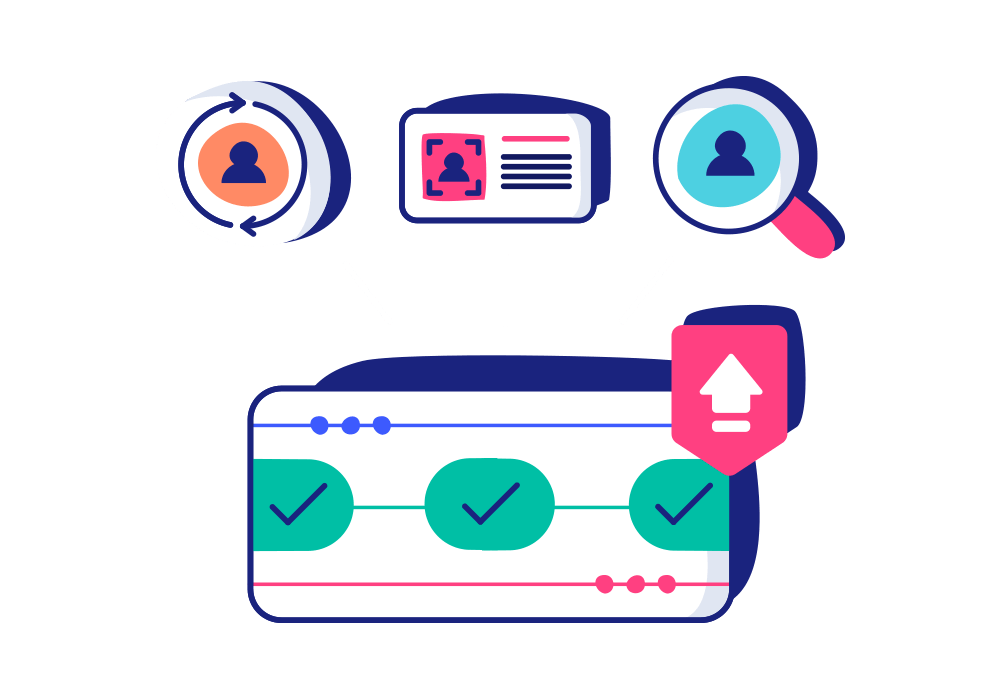
Industry-leading PEP screening service
To ensure that an organization complies with the latest PEP regulations, it is important that the company leadership and employees are aware of who or what a PEP could be.
A certain individual may be categorized as a politically exposed person (or PEP) to reflect their potential risk of involvement in fraud schemes like money laundering, payoffs, or terrorism financing. Although there is no single universal definition for a politically exposed person, it is generally someone who serves (or previously served) in a prominent or highly public role or function. Examples include:
- Company directors
- Board members
- Political figures
- Government officials
- Military officers
Banking and financial institutions that do business with PEPs are required to implement screening measures as a part of their anti-money laundering program. This allows firms to identify an individual’s status upon entering the business relationship and also ongoing, as long as the relationship continues. Depending on the situation, screening requirements may also apply to a client’s family members or close associates, due to the nature and proximity of the relationship to the politically exposed person.
As a part of the onboarding process and ongoing client management, banking and financial institutions must be prepared to comply with local screening regulations. As a result, they must integrate appropriate and effective processes, which include customer due diligence (CDD) and enhanced due diligence (EDD). This compliance will ensure that the organization’s revenue, capital, and reputation are protected from various financial fraud schemes.

Regulatory compliance
Globally, regulations vary greatly by country. However, businesses are increasingly becoming exposed to the risk of financial crimes. In response, countries have implemented strict AML compliance regulations, which include weighty penalties for violations.
Since financial or business relationships with PEPs can be very risky, businesses or financial firms must be fully aware of who they choose to do business with, as well as their ties and connections. Ongoing CDD and continuous monitoring are important practices for regulatory compliance, but they also protect businesses from getting hit with costly penalties, facing legal problems, experiencing financial ruin, or suffering from hits to their public reputation.
Types of PEPs
Financial authorities separate PEPs into several categories, including foreign and domestic, as described below.
- Foreign PEPs – Individuals who are classified as foreign PEPs are those who are appointed to prominent or public roles by a foreign country. Examples may include
- Domestic PEPs – Individuals who are classified as domestic PEPs are those who are appointed to prominent or public roles within their country of residence. Examples may include executives of state-owned corporations, judicial officials, politicians, or heads of government.
Screening each of these types of PEPs (including their immediate family members or close associates) can mitigate your company’s risk of reputational damage or fines. Screening also improves your organization’s awareness of high-risk customers so that you can perform adequate due diligence, which is an essential part of KYC and AML compliance.
Seamless API integration
Putting Cognito’s advanced screening solution to work for you allows your organization to determine a precise level of risk for PEPs and their associates. Getting started doesn’t require a huge investment of time on your part and it doesn’t mean you’ll have to adjust your workflow or onboarding process for new clients. Instead, Cognito’s screening product will integrate seamlessly with your current AML process for a hassle-free and productive transition.
You can quickly and easily integrate our workflow APIs into your existing client KYC/CIP program with our robust IT support to start increasing your organization’s compliance and efficiency right away. For airtight and automated management of your screening process, our simple integration process makes the transition to powerful automated PEP screening both simple and secure.
Ongoing, real-time screening
To conduct full screening measures and comply with local regulations, organizations must collect massive amounts of customer and transaction data to analyze. This involves implementing due diligence measures that include customer-provided information as well as data from existing lists and other reputable sources. Since AML data changes every single day, ultimately, controlling millions of customers’ risk levels daily is an impossible task to complete manually.
Slow updates, an unmanageable number of false positives, and lagging updates often also make the manual completion of this process extremely time-consuming and expensive, especially if you have to re-scan millions of users on a regular basis. Not to mention, in addition to wasting valuable company resources, it can risk the integrity of your entire compliance process.
By integrating smart technology like Cognito’s solution, we can help save you valuable time and money with real-time, ongoing PEP screening. Our product efficiently and quickly screens user details against a proprietary database of sanctions, PEPs, and watchlists. In turn, this leads to better management of your data, compliance obligations, and faster collection and analysis of data.
In addition, Cognito’s automated process reduces the potential for human error when screening both new and existing clientele, with the ability to re-screen hundreds of millions of users each month to catch any status changes.
Learn how we screen for politically exposed persons
If your company has to re-scan millions of users regularly, you have issues with false positives, you need to keep better track of the customer compliance process and maintain an audit trail, or you need a more streamlined onboarding flow, it may be time for a new screening solution.
Cognito’s industry-leading screening product is an automated solution that is designed to enhance your company’s compliance process. It provides real-time ongoing screening, reduces customer friction with gradual verification, and maintains a high-quality screening program that reduces your organization’s overall risk of financial harm or reputational damage.






